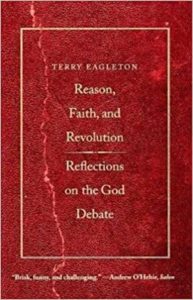
Reason, Faith, and Revolution: Reflections on the God Debate
In 1954 Aldous Huxley published Doors of Perception, an account of his mescaline-induced mystical experience. R. C. Zaehner responded to the wave of experimentation Huxley provoked with Mysticism Sacred and Profane: An Inquiry into Some Varieties of Praeternatural Experience, a book that drew fine distinctions between categories that Huxley had neglected to address. In the same British intellectual tradition, literary scholar and critical theorist Terry Eagleton’s Reason, Faith and Revolution exposes the flaws in Christopher Hitchens’s God is Not Great: How Religion Poisons Everything and Richard Dawkins’s The God Delusion by using a variety of methodologists that make strange bedfellows (Paul, Aquinas, Anselm and Marx). He also illustrates his theses vividly with his characteristic wit, gift for pithy analogy, and ability to find aptly chosen passages from Thomas Mann, William Shakespeare, Jane Austen, John Keats, Charles Dickens, and the drama A Man for All Seasons to name but a few. Students of literature in the 1990s who used Eagleton’s Literary Theory: An Introduction as the seminal text would never have suspected in him a David to topple the Goliath of the New Atheism, but that is precisely his mission.
Reason, Faith and Revolution is based on the Dwight H. Terry Lectures Eagleton gave at Yale University in April 2008. Among his fellows stand Catholic philosopher Jacques Maritain and novelist Marilynne Robinson, all charged with addressing how philosophy and science inform religion and its application to human welfare. As such, Eagleton shows how the rationalist, liberal humanists Hitchens and Dawkins, whom he dubs collectively “Ditchkins,” reject faith on the grounds of the same superstition and prejudice they decry themselves, using Aquinas and the Church Fathers to show that the caricature “Ditchkins” rejects is “the Yeti view of belief in God” (110) and not the genuine Gospel of the New Testament. While Eagleton’s preface distances this project from being a work of apologetics, he calls the intellectual left to account for dismissing the Scriptures. In contrast, he praises the legacy of the Old and New Testaments regarding human emancipation, a value to which he adheres unyieldingly throughout his rigorous discourse, “the Jewish and Christian Scriptures have much to say about some vital questions—death, suffering, love, self-dispossession, and the like—on which the left has for the most part maintained an embarrassed silence” (xii).
Eagleton constructs his argument around four chapters: (1) The Scum of the Earth, (2)The Revolution Betrayed, (3) Faith and Reason, and (4) Culture and Barbarism. “The Scum of the Earth” refers to the anawim, the poor, frail, and helpless for whom God declares his special love. Eagleton challenges pop Christianity’s notion of positivism and prosperity when he declares, “If you follow Jesus and don’t end up dead, it appears you have some explaining to do” (27). Relying on Aquinas and Herbert McCabe’s Faith Within Reason, he challenges “Ditchkins,” as well as Daniel Dennett, in passages whose beauty borders on hymnody in his expositions of God as perfect freedom and the Universe as gift, asserting that Christianity was never meant to offer “a rival view of the universe to science” (7). He comments on“Ditchkins’s” incongruous dismissal of this perceived failure in signature style, “It is rather like saying that thanks to the electric toaster, we can forget about Chekov” (7). This chapter also contains a well-founded critique of materialistic atheism (“the world is not the inevitable culmination of some prior process”) and “purpose-driven evolution,” countering that God created the universe for the sheer pleasure of it. There are soaring reflections about the contingency of humankind and an incisive analysis of parallels between “Ditchkins’s” project and the Faustian spirit-man who falls in love with his seemingly endless powers (15-16). Eagleton also manages to address Phillip Pullman’s erroneous concept of God as “Big Daddy”and to speculate on how Hollywood Scientologists’ wealth allows them the luxury of cultivating illusions more than someone with $38 in his bank account. No one escapes his notice.
“The Revolution Betrayed” is the most ambitious chapter of the book and the one most grounded in Marxism. Eagleton examines a number of betrayals: “Ditchkins” is as guilty as the fundamentalists in dismissing Christianity without a real knowledge of its tenets. Christianity has betrayed itself—only Stalinism fared worse in living up to its claims—in abandoning the poor and dispossessed, while obsessing over Janet Jackson’s exposed breast and lapsing into a suburban cult for the affluent. The Liberal Rationalism birthed by the Enlightenment has betrayed itself on a number of fronts. For example, its adherents are silent about Judaism and Buddhism, but averse to Christianity. Recurring to Charles Taylor ’s The Secular Age, Eagleton refutes Hitchens’s assertion that religion is a stage of arrested development in humankind’s anthropological progress, revealing systematically the holes in his “we’re-getting-better-all-the-time” argument. He concludes this chapter with a commentary on how “Ditchkins,” along with novelists Martin Amis and Salman Rushdie, betray themselves ideologically and politically. Despite posturing themselves as “avatars of the liberal Enlightenment,” they all have attacked Radical Islam instead of the “evils of global capitalism,” turning a blind eye to the role the West has had in creating conditions for its emergence.
In “Faith and Reason” Eagleton draws upon the fund of his considerable scholarship to dismantle Dawkins’s claim that religious faith dispenses altogether with reason. First, he points out how Freudians and political radicals give reason due deference, but also know that it is “not … what is most fundamental about us” (109). He cites Thomas Aquinas’s view that God is outside cognition and argues that his demonstrations of God’s existence were not a proof, but a way to show believers “how their faith can make sense in terms of the natural world” (121). Eagleton’s insights on faith as performative versus propositional and his exposition of a love-based epistemology culminate in a creedal crescendo, “Those who demand a theorem…rather than an executed body are not likely to have faith in any interesting sense of the term” (113). True to his reputation as a critical theorist, Eagleton harnesses SlajovZizek’s critique of fundamentalism to show how “Ditchkins,” too, confuses faith with knowledge, as well as the leftist atheist philosopher Alain Badiou’s theory of “Events” to view Christ’s resurrection, Christian conversion, and participation in community in new categories. He analyzes Jacques Derrida and the postmodern “allergy to certainty,” vindicating theword “dogma” as “things taught” (127, 137). This chapter also includes examples of how science, in fact, trades on its own articles of faith and, rightly, has had to recant throughout its history a number of hypotheses that proved untrue, to say nothing of the horrors it has wrought, a glaring omission in “Ditchkins.”
Eagleton’s conclusion, “Culture and Barbarism,” discusses the economic and political factors that have spawned Radical Islam; it could be subtitled “How the West Was Lost.” Eagleton disputes Dawkins’s thesis that the rationale for 9-11 was based in religious conviction, countering that radicals really do not know their faith well. He enumerates a number of socio-cultural phenomena concurrent with the threat of terrorism: postmoderns declare the death of history only to be confronted with the backlash of radical Islam; the West abandons its grand narratives in pursuit of global capitalism only to run headlong into the dilemma of the need to believe and the incapacity to do so; the new pluralism, indifferent to the content of belief in the name of respect for privacy, and capitalism’s global migration turn out to debilitate political authority and undermine national unity; misguided multiculturalism proves not to be the freedom that Islamists envy; they simply see it as intellectual cowardice. Eagleton critiques the postmodern denial of universal values on the basis of cultural difference, “it’s hard to slide a cigarette paper between Allah and Jehovah” as far as basic morality goes (152) and delineates the distinction between the two types of common culture: one that demands conformity versus the Marxist ideal in which all share a cooperative voice in forging a common identity. He illustrates his compelling treatment of civilization and culture with the antagonists in Thomas Mann’s Magic Mountain: Settembrini exemplifies the rational liberal humanist who denies death and Naphta is the wild Jesuit pathologically in love with it. Eagleton argues for the solution of a “tragic humanism” embodied in the protagonist Hans Castorp, who finds a “death-in-life” (161-64).
It remains for scholars in economics and history to judge the merits of Eagleton’s commitment to Marxism; he affirms its successful reconciliation of culture and civilization unequivocally because Marx managed to reconcile Romantic humanism and Enlightenment rationalism. What is unique about this work is that he proceeds from there to recommend theology as the one discipline that may step into the silent void philosophy and science have bequeathed the twenty-first century. There is much in this study for students of postmodernism to consider. It also provides Evangelical Christians a glimpse—here funny, there sardonic—into how others see us. This work offers a vigorous challenge for Evangelical scholars from the United States to rethink two doctrines separated to to caelo on the grounds that both refuse to accept that this world is “as good as it gets.”























